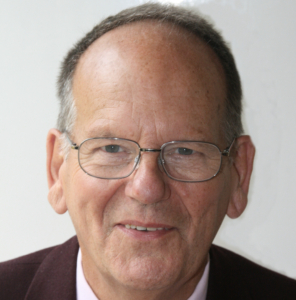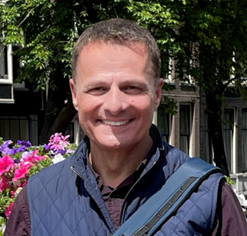
Naturalising Appreciative Inquiry
I hear people talking about what needs to be fixed everywhere. It’s profoundly depressing and lowers everybody’s energy and sense of hope. I’m sure it doesn’t have to be this way.
Nick Heap | United Kingdom
Dr Nick Heap was a scientist, then an OD consultant with ICI (Imperial Chemicals Industries), and has been a volunteer for The Samaritans as well as a counsellor for Relate. He is a self-employed coach, counsellor, facilitator and trainer, and works with individuals, teams and organisations in the charity, private and public sectors. Nick has been using Appreciative Inquiry since 2004
So, I’ve been wondering how we can create an appreciative inquiry where we look at what works, making it the default way we think and interact. How can we spread this revolutionary practice and way of being in the world simply and effectively without using alienating jargon or technical language?
What I’ve done to make AI as natural as breathing
Sharing happy stories
An anecdote: We had friends around for a meal and shared stories about when we were happy. This was an enriching and joyful experience. We learned many ways of being happy, some of which we hadn’t considered. When we talked about a time when we made somebody else happy, our energy went up. So – the simplest way to be happy is to make someone else happy!
I’ve used this exercise in workshops. One was between senior people in organizations that had to work together but with different cultures. When they shared a story about when they were happy, it was very moving. They all talked about their children. One was in near tears as he spoke about his little boy. He loved him so much. The people established a deep human connection and realised that the problems they had at work were trivial compared to what was important, their families.
Sharing happy stories also worked well for greater numbers of people from many different cultures. I put them in small groups, and they had a wonderful time. I can remember the buzz now!
Random acts of listening
A group of us met in a coffee shop and talked about what how we would engage in random acts of listening. It was a scary prospect. We went out individually for an hour into a park and initiated conversations with strangers. The purpose of each interaction was to understand their worlds from their point of view. We had to make a natural connection, not start with, “Are you willing to answer some questions?” So, you might say, “Oh, what a lovely, lively dog!”, which could lead to a conversation where you listened a lot.
It was astonishing how much people we approached enjoyed the exercise and wanted to talk. Sometimes the conversations were deep. One person talked about his sudden, shocking bereavement. We found a fantastic range of skills and experience in the people in the park. I met a man from Israel who was an expert in psycho-acoustics, the way to design a concert hall which people enjoy being in. He spoke about the differences between bringing up a child in the UK versus Israel, which he said was mainly because of the difference in climate.
I met a young Portuguese couple with a seven-day-old baby. The man told me how much he’d been looking forward to being a father and what it had been like so far.
It’s also interesting to notice who we found easy to approach and who we avoided. I’m an elderly man, so I was reluctant to speak to young women as I wondered what they would think of me. I faced my prejudices about tattoos and piercings when I met a sensitive and thoughtful man who was heavily tattooed and a young woman with piercings carrying a violin who was about to play at a concert of baroque music.
I could have taken these conversations further. A young mother told me how much she loved being a mum. I didn’t take the time to ask what she enjoyed about it.
The original group met again after an hour to talk through our experiences and learning. The exercise has had a profound effect on me. My chronic shyness has gone, and I’m reaching out to people who live near me now.
What could you do to spread Appreciative Inquiry ‘in the wild’? What have you already done?
How and where can we explain what Appreciative Inquiry is in a way that people can hear?
A bright ten-year-old could understand it. It is a simple idea. We could say, “When you ask people what’s wrong, they usually feel miserable and overwhelmed. If you ask people what’s working, they feel good. Then, you can ask them how things could be even better and how they could get that to happen. Even when things are terrible, if you ask people how they cope or how they survive, a positive question makes people more confident and willing to see how to make things better. This is what Appreciative Inquiry is about.”
I would like to see this information in magazines, newspapers, on television, and for it to be taught and used in schools. It might also be good to show people. Let’s stop having programmes about “neighbours from hell” and see stories about “neighbours from heaven”.
The media assumes that people are interested only in bad news. It’s worth testing. Bad news all the time depresses people. It suppresses our energy to create positive change. This is in nobody’s long-term interest. We could get together in small groups and write separate letters or call influential people and organisations to suggest a more appreciative approach. Many of us live in countries with a free press where we can express ourselves. Let’s use it positively.
What is your best idea about how to communicate AI simply? What have you already done that has worked?
Where is Appreciative Inquiry thinking and practice most needed now?
It’s needed everywhere. If I had three wishes, I would wish to embed AI in families, in education and in politics. Imagine the effect of paying attention to what’s working in families. Whatever you pay attention to grows. We can choose to grow love, connection, partnership, fun, mutual understanding, creativity and joy. Children raised in this environment will hang on to their natural zest, ability to learn, power and humanity. They will become the remarkable adults we need to lead us to a more sustainable and healthier world.
Education would become more about discovering and developing the unique talents and interests of the individual child. We can’t predict what work will be available or what life will be like for young people in twenty years. We can predict that young people will need to learn new things, so let’s focus education on encouraging them to learn rather than telling them what to think.
The complexity and interconnectedness of the modern world demand cooperation, not competition and conflict. Although politics appears to be broken, there will be examples of outstanding collaboration and creativity. Appreciative Inquiry could help us identify and magnify these.
Where is our practice and thinking most needed now? How do we start? What is already working?
What are simple micro-practices that we can do every day?
I’ll share one. If someone smiles at me, I say, “Thank you for your smile”. What we pay attention to grows. What do you do to “Be AI”?
What micro-practices will you do in the next few weeks to Naturalise AI?
Any comments on any of this are welcome!
Intro by Keith Storace
In her four-part series “A Practitioner’s Journey to Living with Climate Change”, Alex Arnold has advocated for a transformative approach to climate resilience and action grounded in the principles of Appreciative Inquiry. She has emphasised the significance of positive language, values-driven questioning, hopeful focus, and aligning actions with personal strengths as tools to build climate resilience and inspire change from within. Alex’s final article in this series, “Climate Action Starts Within”, focuses on the five core principles of Appreciative Inquiry, emphasising that positive conversations about climate change can foster hope and inspire action. I would like to thank Alex for her depth of knowledge and the inspirational outlook she has shared throughout this valuable and timely series!
Also, in this issue of AI Practitioner, Dr Nick Heap presents his work and focus on “Naturalising Appreciative Inquiry” where he emphasises that, by shifting our perspective towards positive interactions and shared experiences, we can foster deeper human connections and inspire hope. Contemplating key questions and sharing uplifting stories, such as moments of happiness, can help bridge cultural or organisational divides. Simple daily practices, like acknowledging a smile, can be a step towards embedding AI into our daily lives, cultivating a world with more love, understanding and cooperation.
It is my pleasure to present Alex Arnold and Dr Nick Heap and their insightful work!



